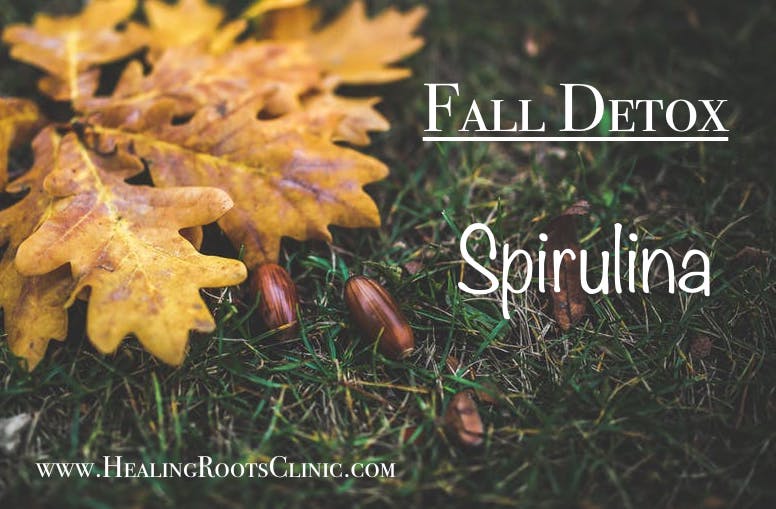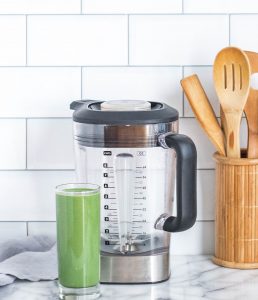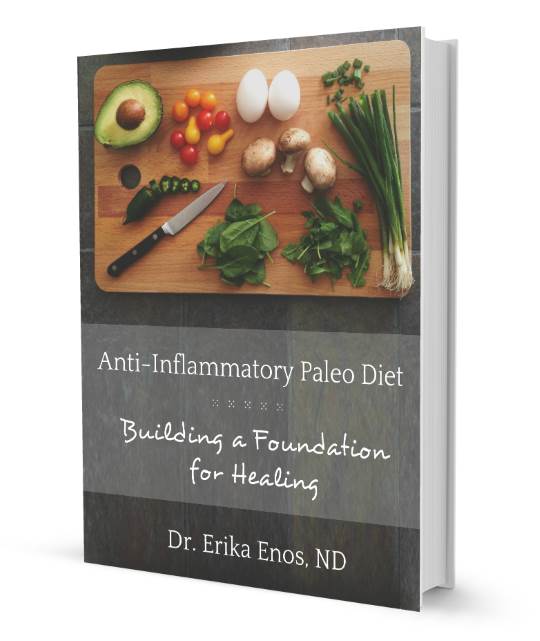
Spirulina
Chlorophyll is found in green plants and algae. It is what makes them green and allows them to capture sunlight to make energy for the plant. Structurally, it is very similar to the heme in hemoglobin. Hemoglobin is a protein that carries oxygen on your red blood cells. The only structural difference between hemoglobin and chlorophyll is that the former contains iron and the latter contains magnesium at its center.
In the Spring Detox series, I talk about Chlorella, a green micro-algae that is rich in chlorophyll. In this Fall Detox series, I want to talk about Spirulina, a blue-green micro-algae without a nucleus that also contains chlorophyll. Chlorophyll is obviously important for plants, but what can it do for your health? There’s a lot!
7 Benefits of Using Spirulina
From improving gut health to boosting the immune system to reducing allergy symptoms, Spirulina is a great supplement for almost everyone to use. However, it’s contraindicated for those with PKU because the amino acid phenylalanine will reach levels that are too high.
Here are some of my favorites about what the research shows that Spirulina can do:
- Promotes gut health. Spirulina promotes better gut health and gut immunity by increasing secretory IgA and lactobacillus. Secretory IgA is a marker of immune function in the gut and can be lowered by stress and continual inflammation. (1, 2)
- Boosts the immune system. Spirulina has been shown to boost levels of natural killer cells in several studies. This has great potential for both cancer and viral infections. Viral infections include common infections such as CMV (Cytomegalovirus) and the whole herpes family including EBV (Epstein Barr Virus). CMV and EBV have both been implicated in chronic fatigue. Spirulina has also been shown to increase the phagocytic activity of macrophages (phagocytic activity = gobbling up invaders), improve signaling in the immune system, and increase antibody production. One human study showed a decrease in anemia and increase in white blood cells (immune system cells) in elderly patients who supplemented with spirulina for 12 weeks.(3, 4, 5, 6, 7, 8)
- Reduces allergy symptoms. Supplementation with spirulina has been shown to reduce nasal discharge, congestion, itching, and sneezing. The anti-inflammatory effects of spirulina stabilize mast cells and offer a reduction in the release of histamine. And histamine is what causes most symptoms associated with allergies. Additionally, spirulina impacts Th1/Th2 (helper T cells) balance which also impacts proclivity for allergies. For humans, a dose of 2,000 mg of Spirulina once daily has been shown to be effective. (9, 10, 11)
 A good source of nutrients. Spirulina is rich in protein — it is about 70% protein with an excellent amino acid profile, which is unusual in vegetarian sources. It also contains iron, GLA, carotenoids, vitamin B1, vitamin B2, iodine, selenium, zinc, manganese, and chromium. It may have the potential for nutritional rehabilitation in people who are malnourished. (12, 13)
A good source of nutrients. Spirulina is rich in protein — it is about 70% protein with an excellent amino acid profile, which is unusual in vegetarian sources. It also contains iron, GLA, carotenoids, vitamin B1, vitamin B2, iodine, selenium, zinc, manganese, and chromium. It may have the potential for nutritional rehabilitation in people who are malnourished. (12, 13)
In addition, research also shows that Spirulina helps with:
- Lowering cholesterol. Spirulina dosed at one gram/day for 12 weeks to Greek men and women with high cholesterol showed that participants saw a reduction in triglycerides, LDL, and total cholesterol. Many other studies support these findings and some suggest that spirulina additionally increases HDL (“good” cholesterol). (3, 14, 15)
- Detoxifying carcinogens and poisons. Spirulina promotes Phase II detoxification in the liver, the process that helps the body to deal with carcinogens. Benefits aren’t limited to the liver because kidneys’ and lungs’ capabilities also improved with spirulina supplementation. Additionally, spirulina improved the function of several antioxidant systems in the body. The authors of an animal study concluded that spirulina has potential benefits in cancer prevention. Other studies have found that spirulina can help humans recover after being poisoned with arsenic and animals who have been exposed to cyanide. (16, 17, 18)
- Preventing cancer (antioxidant) and being anti-inflammatory. Many of the vitamins and proteins in spirulina have antioxidant and anti-inflammatory properties. C-phycocyanin, one of the proteins, has been shown to be a COX-2 inhibitor that decreases inflammation, for example, in conditions such as arthritis. (19, 20, 21, 22)
Supplementing with Spirulina
For a Spirulina powder that you can add to smoothies, I like Hawaiian Spirulina by Nutrex Hawaii. And for Spirulina capsules that you can swallow, I like the ones from Mountain Rose Herbs.
What About You?
Have you tried spirulina before? Are you going to start now? I would love to hear what you have to say in our comment section. Please inspire each other!
As a registered Naturopathic Doctor in the state of Colorado, I specialize in addressing the underlying issues related to thyroid, autoimmunity, digestion, chronic congestion, and adult acne. If you’re interested in working with me, schedule a free “Is this a good fit?” office or phone consult so that you can find out how I can help you.
(Amazon Affiliate links are located in this post.)

Spirulina is a superfood and it contains all the contents which we need in our daily life. It contains the maximum percentage of protein in it so we can say that it is a superfood. Your post will make many people aware of spirulina and motivate them to use it.
Thanks For Post!
I definitely need this spirulina, because, during spring, especially in May, I have allergy symptoms. I hope, that it will help me.
In my opinion, spirulina is one of the most useful substances that must be included in your diet in order to fill it with useful elements.